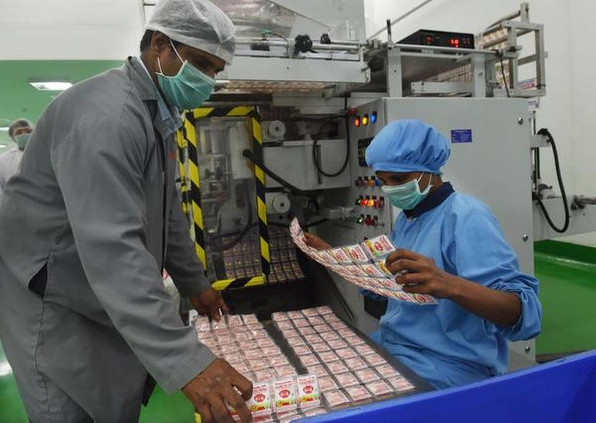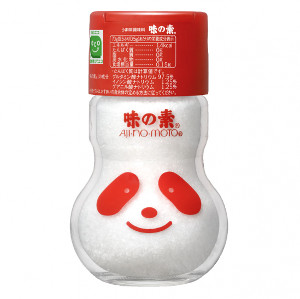You can be branded a racist these days for any old stray comment that might tend to tar entire cultures with a single brush. And it doesn’t matter if you made your comment 20 or 30 or 40 years ago, when the social context was totally different, and what’s ‘wrong’ now was right, or at least ‘not objectionable’…
 MSG is packaged under clean-room conditions at the Ajinomoto plant in Japan.
MSG is packaged under clean-room conditions at the Ajinomoto plant in Japan.
The company is the world’s largest producer of the seasoning, shipping
more than (US)$10 billion worth of the product each year.
Before I delve any further into this bound-to-be-touchy topic, let me point out that I jumped on the ‘rehabilitate MSG’ bandwagon some time ago, well before it became fashionable. My previous post here proves it.
Now… Where was I?
Oh, yes. It’s been suggested that folks who still refer to allergy-like symptoms some people used to experience after dining at Asian Restaurants as ‘Chinese Food Syndrome’, and fear or despise MSG as a result are racists. If that was true, my own broad experience talking to people about food would indicate that Western Society is chock full of racists.
To be fair, you can’t be racist just for disliking a cooking ingredient or cooking style. That’s a matter of taste. But if you carry over that fear, suspicion or dislike to Chinese people, particularly as an umbrella group, prepare to be demonized. Maybe you actually do deserve the label ‘racist’ if you do that. But let’s just stick to the MSG connection fore the moment.
What is MSG?
MSG – short for Mono-Sodium Glutamate – is a combination of Glutamine, an amino acid that blesses everything it touches with an umami halo, and Sodium, which is merely there to stabilize the Glutamine so it can be processed into convenient flakes.
MSG was first isolated from Seaweed over 100 years ago by Japanese scientist Kikunae Ikeda. It quickly became popular in China and Taiwan and came to North America with Chinese immigrants. After the Second World War, Chinese (Asian) restaurants became extremely popular in North America, and MSG became a standard – though hidden – part of the Caucasian diet.
MSG was even outed as a ‘third seasoning’ along with Salt and Pepper, in the post war years and at its peak of popularity was sold as a branded product, Ac’cent, by the 1950s. The advertising line was, a little Ac’cent could make anything savoury taste better. Millions of Ac’cent users agreed with that contention.
What happened?
According to a recent article in the Colombia Graduate Research Journal by Tomas Germain, titled A Racist Little Hat: The MSG Debate And American Culture, the author suggests that the well-known demonization of MSG as unhealthy was actually motivated by racism.
“…[T]hings changed when Chairman Mao seized control of China in 1949. Suddenly, our perception of the Chinese changed, and they were more than just foreign and confusing. There was something legitimately scary about them in the eyes of mid-century Americans: they were communists. The association between Chinese food and health problems was an easy connection for Americans to make because the Chinese were threatening. In order for Americans to justify their fears, they latched onto MSG. Moreover, “scientific” was no longer an appealing attribute; it made MSG seem strange. Just like the Chinese.
“In the ‘60s and ‘70s, Americans turned away from MSG because of negative feelings about the Chinese; and in the same way, the modern push to reintroduce MSG to polite society is as much about a desire to be anti-racist as it is about MSG’s effects on our health. What we are left with is an argument so polarized that thoughtful consideration is not taking place.”
The trigger for racist thought
Germain pinpoints to the pivotal point at which MSG became inextricably tied to ‘China’ and Chinese Food’ as coming in 1968, when “… [A] recent Chinese immigrant, Dr. Robert Ho Man Kwok wrote a letter to the editors of the New England Journal of Medicine (NEJM). Dr. Kwok complained of a strange set of symptoms he experienced when he ate at ‘certain Chinese food restaurants’, symptoms he did not experience when he ate back in China or in his own home cooking He described ‘numbness at the back of the neck, gradually radiating to both arms and the back, and general weakness and palpitation’. Dr. Kwok speculated about a few potential culprits for these maladies, with MSG among them. The NEJM gave his letter the amusing title ‘Chinese Restaurant Syndrome’.”
And that was that.
The result
More-recent scientific research has shown that MSG is not (and never was) the culprit in the discomforts Dr. Kwok described in his infamous letter, and there is nothing particularly ‘Chinese’ about it. But the unfortunate association persists in the minds of millions of Westerners, especially those who went through their socially impressionable teen years when the whole controversy over ‘Chinese Restaurant/Food Syndrome’ was taking place.
The takeaway
So… It’s okay to not like certain Asian foods, even specifically Chinese ones. It’s even okay to express your suspicions about MSG – just don’t use any adjectives such as ‘Chinese’ or ‘Asian’ in the same sentence. Better yet, don’t use any adjectives at all, just to be safe.
~ Maggie J.

